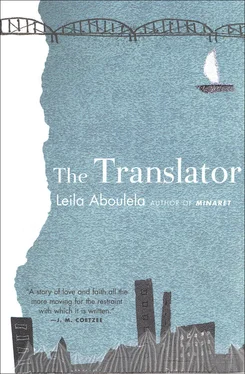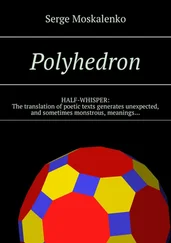At home among people she had known all her life, she would remember things she had come to know about him. The names of books lined up on the wall of his office, How Europe Underdeveloped Africa, The Wretched of the Earth, Religion in the Third World, Culture and Imperialism, Radical Islam, Terrorism in Africa, Muslim Extremism in Egypt.
She knew the different ways that he talked. Guarded, very careful when she asked him where he got this document of Al-Nidaa. ‘I have friends.’ Smiling, almost smug, as he held the stained papers in his hand and said, ‘Researchers would kill for something as grass-roots as this!’ And his voice once on the radio, on a discussion-type programme, speaking with a nervousness and urgency that was not familiar to her, “… not the biggest threat facing the Western world. If we look at real terrorist damage, Muslim extremists have caused much less of it than the IRA, the Red Brigade, the Baader-Meinhof gang, the Basque separatist ETA…’
A shift after the Winter Gardens. At the end of a long, full day when she knocked at the door of his office and he pushed back his chair. ‘You I always have time for, I can’t bear anyone else at this moment except you.’ Lecturing her, ‘A so-called developing country is characterised by three things: one, an export-based economy; two, an inadequate infrastructure; three, a history of colonial rule.’
She knew about his asthma. Intrinsic, not triggered by an allergy. He would take two puffs of Ventolin from a blue inhaler. Shaking it first, casually while talking about something else. It left a line of powder on his lips which he licked away. The rasping sound his chest made, when she listened closely enough. He looked tired at the end of the day. Tired and coughing as winter drew in with its germs, coughing and apologising. Excuse me, Sammar, Sorry, Sammar, until her own chest hurt.
A shift after the Winter Gardens. He asked her to have her lunch with him, in his office with the glass-panelled wall through which the coffee-scented secretaries scribbled Christmas cards and Yasmin, pregnancy visible now, stared at Sammar. He was quite proud of his lunch, carefully prepared. Tuna sandwich, malted bread, two apples, four oat-bran biscuits, a can of Irn-bru. In a cold rush of intimidation, Sammar thought, is this what he does every morning, prepares his lunchbox with care. Her sandwich, smeared only with butter, was wrapped up in the same clingfilm as the day before — she could barely manage to drag herself to work in the morning darkness. And, horror, it was true, there was a green furry spot on the edge of the bread she was holding in her hands. Stinging shame, mouldy sandwich. Clumsy exit, days of avoiding him, avoiding Yasmin. Only listening to his students praise him; lyrics from Sierra Leone, in Arabic from the Algerian lady.
She turned on the tap and the gush drowned the sound of Lesley’s TV. Of all the people in the building, Sammar saw Lesley the most. Lesley was the one who answered the telephone in the landing, a pay-phone shared by everyone except Lesley, who had her own portable telephone with answering machine (won as a prize from the Littlewoods catalogue). When Sammar and Lesley spoke they spoke of the weather or Lesley complained about the other tenants. The students who quarrelled and one of them called the police, ‘what a carry on’; and how the girl in 3b ended up in Casualty when she covered herself in cooking oil and lay in the sun of a heatwave July. Lesley was always busy, she went out in every kind of weather to play Bingo. In the months when Sammar had hauled her pain up and down the stairs, she would admire Lesley, so many years older than herself and more full of life. Living alone and filling up with her own self the empty space of a flat, a garden, a niche in life.
Thirty-five minutes past three and Sammar ate a date that tasted even sweeter because she was breaking a fast. Then she drank the water and felt herself to be simple, someone with a simple need, easily fulfilled, easily granted. The dates and the water made her heart feel big, with no hankering or tanginess or grief.
She rinsed her hands. Her wet face in the mirror was not different from the Sammar of the past, softer perhaps, blurred, the eyes dimmer than they had been. She rinsed her feet. Yesterday she had noticed her feet, noticed their dryness and cared enough to buy a pumice stone. She had scraped the rough skin that had not been removed for years. She had also noticed her hair, put unsalted butter on it like she had done before, wrapped it in silver foil and felt the butter melt through her scalp before she shampooed it away. Her hair will become stronger that way, shiny after the years of neglect, the strands of white that Tarig had not seen.
Her prayer mat had tassels on the edges, a velvety feel, a smell that she liked. The only stability in life, unreliable life, taking turns the mind could not imagine. When she finished praying, she sat for the tasbeeh, her thumb counting on each segment of her fingers, three for each finger, fifteen for a hand, Astaghfir Allah, Astaghfir Allah, Astaghfir Allah, … I seek forgiveness from Allah … I seek forgiveness from Allah … I seek forgiveness … the twenty-ninth time, thirty, she heard the telephone in the landing ring, thirty-one, thirty-two, Lesley’s footsteps on the stairs, thirty-three, and what was left of her concentration scattered with the knock on the door.
His voice sounded complaining, the first greeting, her name and she felt herself tugged away from the day that had been unrolling upstairs. He said, ‘It’s Rae here,’ as he always did at work on the telephone. She was slow in replying, wondering why he was calling her on a holiday, from another city. He asked, ‘Were you asleep?’ and this made her laugh, warm towards him, he who was able to imagine a siesta in the darkness of a British Christmas afternoon.
‘I finally managed to get hold of that Azhar thesis I was telling you about,’ he said. She remembered him mentioning it, the topic was about justice and the ruler or the unjust ruler, she was not sure.
‘That’s good,’ she said. ‘It’s been difficult to get hold of?’
‘Slow. But I’m very pleased now.’ He did not sound pleased, though, his voice sounded strained. ‘We’ll meet when I get back. Maybe you could start translating the abstract and the title chapters, the introduction perhaps. You’re leaving soon, you won’t have much time.’
‘Six weeks,’ she said, ‘about six weeks.’
‘You’re counting the days?’
‘Sometimes. I think I will have time to do the introduction too, if it’s not very long.’
‘We’ll see when I get back and show it to you,’ he said. She expected him to end the conversation, say goodbye. She did not expect the silence that followed.
‘Are you enjoying the holiday?’ she asked.
‘No, not enjoying it. There is too much talk of food in this house. They are food connoisseurs here. They eat and at the same time talk of other meals, reminisce about dishes. Over breakfast they’re planning what they’ll cook for dinner, arguing about it.’
‘They,’ Sammar learned, were his ex-wife’s family. He was staying with them because his daughter, Mhairi, was there. She spent the school holidays in her grandparents home. Her mother was still in Geneva, where she worked with the WHO.
Culture-shock for Sammar. An old man in Edinburgh was allowing his daughter’s ex-husband under his roof. This must be civilised behaviour, an ‘amicable divorce’. Where she come from, the divorced spouse was one who ‘turned out to be a son of a dog’ or ‘she turned out to be mad’ and were treated as such. No one ‘stayed friends’, no one stayed on talking terms.
Читать дальше












